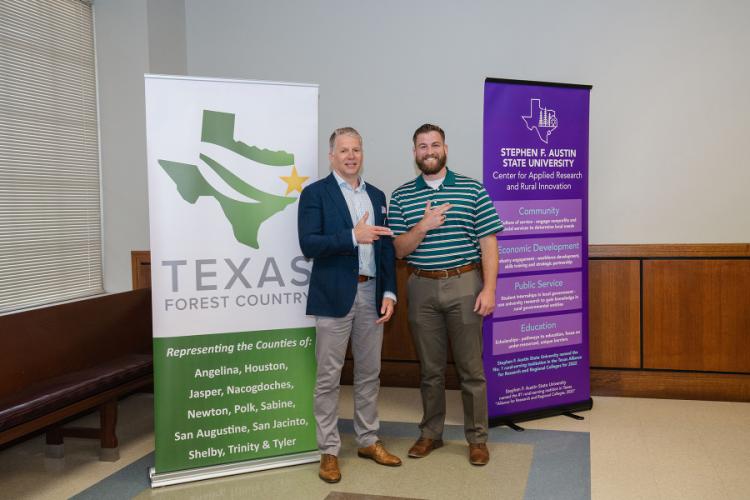NACOGDOCHES, Texas — Several economics and finance seniors in Stephen F. Austin State University’s Rusche College of Business spent the fall semester working on real-world economic problems in deep East Texas as part of a grant received by the college’s Center for Business and Economic Research.
The grant, issued through SFA’s Center for Applied Research and Rural Innovation, gave CBER nearly $24,000 to establish and maintain a set of metrics that CARRI’s staff members can use to measure the economic contribution of CARRI activities to the region. It also supported economic development work specifically for Nacogdoches. The grant helped cover paid internships for Clay Patrick of Livingston, Dan Nguyen of Vietnam and Chareese MacDonald of Lufkin.
In addition, Ryan Knights, an economics senior from Cypress, worked with CBER on several economic impact assessments, including one for The Cole Art Center @ The Old Opera House. This project was a contribution to another CARRI grant awarded to faculty members in SFA’s School of Art.
“The work these students did will benefit deep East Texas for years to come,” said Dr. Mikhail Kouliavtsev, CBER director and chair of SFA’s Department of Economics and Finance. “They learned how to collect and analyze data on health care access, broadband access, and workforce availability and preparation as well as job attributes that employers are seeking to fill. They also learned how to help local businesses.”
As part of his work for the grant, Patrick, an economics senior, helped host 12 rural economic development forums — one for each county in deep East Texas. He said working with CARRI to collect data from the counties and exchange information with local community leaders will help him as he applies for economic development positions in the future.
“The counties are struggling with keeping younger people in their areas while trying to increase health care access for the growing retired portion of the population,” he said. “These challenges helped me learn about various applications of economics in the real world.”
Nguyen, a finance senior, analyzed data from the 12 counties covering a span of two years (2021-22) to create the dashboard CARRI uses to assess its impact in the local area. This included about 1,150 records across demographic, health, education, labor and workforce indicators.
“The dashboard provides a comprehensive overview of the region's socioeconomic landscape, aiding in informed decision-making to allocate resources effectively, plan policies and address specific needs within the community,” Nguyen said.
In addition to honing her data analysis skills, Nguyen said her CBER work taught her a lesson in patience.
“I had this tricky tech problem,” she said. “At first, it felt like a total puzzle I couldn't crack; but instead of giving up, I dived into researching and fixing it. Solving that issue felt awesome and taught me how important it is to stick with a problem and be proactive at work.”
Nguyen added that the opportunity to work independently, engage with diverse datasets and contribute to real-world projects was invaluable.
“It not only enhanced my technical skills but also provided insights into the practical application of data analysis in the real professional world,” she said. “It really set me up for my dream job as a financial analyst.”
MacDonald’s work at the Nacogdoches Economic Development Corporation, or NEDCO, ranged from tackling EDOiQ economic development software to conducting a wage and benefit survey of local businesses to exploring the impact of SFA on the community.
“I also got to learn a lot about how the city provides assistance to local businesses not only financially but also through educational opportunities for them,” said MacDonald, an economics senior who plans to pursue a Master of Business Administration.
In addition, she got to witness a historical win by the city — the announcement by intelligent power management company Eaton that it is adding 200,000 square feet to its Nacogdoches manufacturing facility, more than doubling its size and creating over 200 skilled manufacturing jobs.
“NEDCO employees care so much about the city,” MacDonald said. “When they found out about Eaton, all of them screamed with excitement, and then interim City Manager Keith Kiplinger came in and they all celebrated!”
She said she would recommend her CBER experience to other students.
“Getting to see Nacogdoches through the lens of a resident instead of a student who just goes to college here was the most impactful part of the internship for me.”
For more information on CBER, visit sfasu.edu/cber.
ABOUT STEPHEN F. AUSTIN STATE UNIVERSITY
Stephen F. Austin State University, the newest member of The University of Texas System, began a century ago as a teachers’ college in Texas’ oldest town, Nacogdoches. Today, it has grown into a regional institution comprising six colleges — business, education, fine arts, forestry and agriculture, liberal and applied arts, and sciences and mathematics. Accredited by the Southern Association of Colleges and Schools, SFA enrolls approximately 11,000 students while providing the academic breadth of a state university with the personalized attention of a private school. The main campus encompasses 421 acres that include 37 academic facilities, nine residence halls, and 68 acres of recreational trails that wind through its six gardens. The university offers more than 80 bachelor’s degrees, more than 40 master’s degrees and four doctoral degrees covering more than 120 areas of study. Learn more at sfasu.edu.
 Axe ’Em, Jacks!
Axe ’Em, Jacks!
